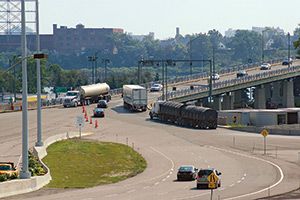Program to Allow In-Transit Canadian Freight by Truck to Resume Through United States

This story appears in the May 9 print edition of Transport Topics.
Shipments that begin and end in Canada, but travel through a portion of the United States, are likely to resume late this year or in early 2017 — a practice that was suspended for more than a decade after the 9/11 attacks.
A U.S. Customs and Border Protection six-month pilot program involving nine Canadian carriers is expected to begin May 27, according to a notice in the Federal Register on April 27, regarding what is known as in-transit shipments.
The full suspension went into effect in January 2005 in the wake of legislation passed by Congress in 2002.
The Federal Register notice had been planned since October 2014, when both nations’ border agencies agreed to limit the data required for domestic goods transiting through the other country and proposed that Canadian carriers unable to provide a specific value of a shipment would designate a default value of $95,000.
“On most issues pertaining to trucking and the border, it’s a process, and like any process, they grind out over time,” Canadian Trucking Alliance President Stephen Laskowski said. “There was always a commitment to get it done, but it involved multiple parties and systems changes, and any time you get into those types of issues, they become a bit slow and frustrating. But we’re happy with where we are today. Should there be no issues, as we expect, we would fully expect the pilot status would be removed and the in-transit system would be fully restored.”
Before the 9/11 attacks, Canadian carriers frequently used U.S. routes in-transit. Since the goods were not entering the United States to be used, offloaded or stored, they were considered domestic Canadian loads and required minimal documentation.
According to Laskowski, in-transit shipments can save Canadian carriers hundreds of miles. That also holds for some U.S. counterparts in northern states, where in- transit shipments were never halted, he said.
“Mail shipments between Michigan and New York state are all in-transit through Canada,” he said. “Every piece of business that other U.S. states do with Alaska by truck moves in-transit through Canada. This is truly a U.S.-Canada northern border issue. So our position was, ‘What’s good for the goose is good for the gander. If we can’t move in-transit, why should you?”
Boyd Stephenson, vice president of international supply chain security for American Trucking Associations, called Customs’ decision “wonderful news.”
“We’re very pleased that we were able to work with our associates on the northern side of the border to achieve a result that will be beneficial to both countries’ trucking industries,” Stephenson said.




